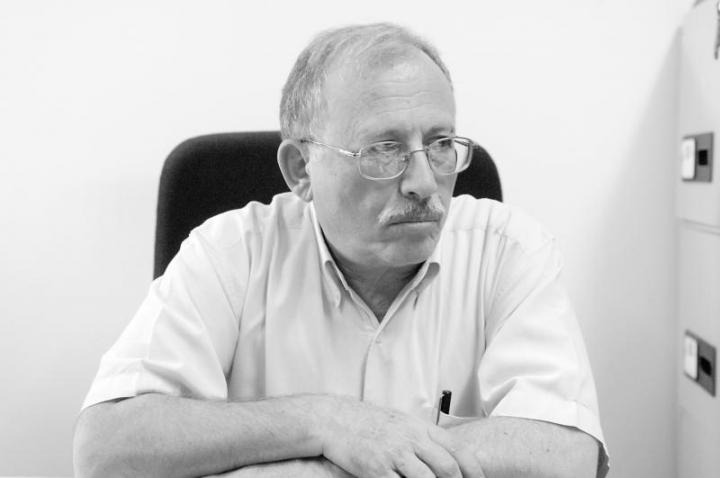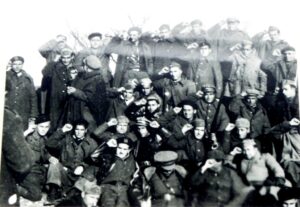
“Cypriot antifascists of the International Brigades in Spain” by Yiannakis Colocasides, Member of the Central Committee of AKEL
90th anniversary of the Communist Party of Cyprus-AKEL 1926-2016
Sunday, 24th January, 2016, “Haravgi” newspaper
 Spanish Civil War, 1936-1939. The Battle of Jarama in February 1937, the Battle of Teruel in December 1937- February 1938. Why do we remember this blood stained war and these specific battles? We remember them not only because this year marks 80 years since the beginning of that war, but also because Cypriot anti-fascist volunteers fought, and many of them were killed, in these decisive battles, sacrificing their lives for the sake of fulfilling their internationalist duty and the anti-fascist struggle.
Spanish Civil War, 1936-1939. The Battle of Jarama in February 1937, the Battle of Teruel in December 1937- February 1938. Why do we remember this blood stained war and these specific battles? We remember them not only because this year marks 80 years since the beginning of that war, but also because Cypriot anti-fascist volunteers fought, and many of them were killed, in these decisive battles, sacrificing their lives for the sake of fulfilling their internationalist duty and the anti-fascist struggle.
The Spanish Civil War is one of the most dramatic events in world history during the 20th century. In the 1930’s Spanish society had reached a critical juncture. The painstakingly slow development of capitalism, the strong semi-feudal remnants, the random reforms left uncompleted, the aftermath of a violent imperial past, the serious deficits in democracy and absence of a parliamentary tradition, the frequent coup d’états, the dominance of the Catholic Church, the unresolved problem of the land, the development of the working class without however having rights and its mobilizations – more often than not – being repressed and drowned in blood – all of these elements made up an explosive mixture.
In this tense climate, the Popular Front wins the elections held in February 1936. The Popular Front was a broad coalition of political and social forces of the Left and the Centre. Thus, the prospect and hope for a different path to democracy and social progress was born. Conservative forces however reacted to this prospect. They had no desire to give up and surrender their privileges and dominance. They refused to accept the verdict of the people as expressed in the elections. And they took up arms to overthrow the government of the Popular Front and maintain the old established order in power.
General Franco became the champion of these forces. The coup d’état of 18th July 1936, led by Franco, marked the start of the three-year bloody and devastating civil war which soon assumed pan-European and international dimensions.
The Spanish Civil War was characterised – certainly not without reason – as a prelude to the Second World War. In Spain, as in World War II, fascism on the one hand and democracy and progress on the other clashed in a life and death battle. On the battle fields of Spain the domestic fascist forces didn’t just fight against the local progressive democratic forces; the entire fascist world in that era confronted all those forces that represented democracy and progress internationally.
Hitler and Mussolini reinforced by all means their former coupist associate Franco. They sent him weapons, planes and tens of thousands of soldiers to fight on his side. Contrastingly England, France, USA and others established the Non-Intervention Committee and subsequently imposed an arms embargo on the “warring factions”. This embargo only affected the democratic forces, as Franco was being supplied continuously with weapons from Nazi Germany and fascist Italy. Only one State provided support, as a state, to the lawful democratic Spanish government, and that was the Soviet Union.
The policy of non-Intervention necessitated the mobilization of the popular masses. On the initiative of the communists the International Brigades were formed. Besides the communists, socialists, Catholics and other democratic citizens and antifascists of every ideological persuasion also participated in the ranks of the International Brigades. The International Brigades made their way to Spain and fought on the side of the democratic forces. It is estimated that around 60,000 internationalist anti-fascists went to Spain to fight fascism. The International Brigades played a decisive role in the defence of Madrid and excelled in all the major battles of the three-year anti-fascist war. The International Brigades were the most dynamic expression of internationalist solidarity that the world has seen.
Cypriot antifascists
 Cyprus was not absent form this international call as well. Cyprus back then was suffering under the oppression of the British Empire yoke during the period of Palmerocracy[1].
Cyprus was not absent form this international call as well. Cyprus back then was suffering under the oppression of the British Empire yoke during the period of Palmerocracy[1].
Dozens of our compatriots voluntarily rushed to Spain and joined the ranks of the International Brigades. Paul Strongos, who studied exhaustively the whole issue in his book “Spanish Thermopylae – Cypriot volunteers in the Spanish Civil War, 1936-1939” considers that the Cypriot volunteers numbered 57. According to his research, 19 of them fell heroically fighting for democracy and the freedom of the Spanish people. If we take into account the population of Cyprus back then, perhaps proportionally the Cypriot volunteers were the most of any country.
The Cypriot anti-fascists in totality were Cypriot immigrants in Britain, the United States and other countries. Within the conditions of Palmer colonial regime it wasn’t possible for any volunteer to go directly from Cyprus to Spain. All the Cypriots of the International Brigades belonged to the Left. As Paul Strongos points out, “The Cypriot volunteers based in the United Kingdom were primarily active members of the Communist Party of Great Britain which had within its ranks “Cypriot Branches” and published their own propaganda material in the Greek language.” While with regards the Cypriot volunteers from the US, he states that “they were politically active in the Communist Party of the United States and the” Pancyprian” association, the main Cypriot cultural organization in the US during the 1930’s.” Many of the Cypriot volunteers before emigrating were members of the Communist Party of Cyprus (CCP), such as Giakoumis Georgiou and Kostas Lapithiotis who was actually a member of the Central Committee of the CCP. The most well-known of the Cypriot volunteers was the future General Secretary of AKEL Ezekias Papaioannou, who was also wounded in the battle of Cordoba. Another well-known anti-fascist fighter of Spain is Michalakis Economides who even managed to rise to the rank of Political Commissar in the unit he served. He was wounded at the Battle of Jarama.
In the battle of Jarama, mentioned at the beginning of our article, Panagiotis Katsaronas from Larnaca, Konstantinos Avgerinos a Cypriot originally from Istanbul, Nikos Perdikos from Giallousa and Angelos Romanis from Nicosia were all killed.
Many Cypriot anti-fascists fought in the battle of Teruel, such as Anastasis Antoniou from Ayios Elias (killed in March 1938 at Caspe), Iakovos Koumoullos from Lefkara (killed in the battle of Aragon in March 1938), Christos Constantinou from Bella Pais (also killed in the battle of Aragon in March 1938), Demetris Tsinikolas from Ayios Elias (killed in Belchite in March 1938), Spyros Pantelides from Kato Drys (killed in 1938), Vassilis Pattichis from Lefkara (killed in Belchite in March 1938), Sergios Rossides (killed in the battle of Aragon in March 1938).
The other fallen Cypriot anti-fascists in the battle fronts of Spain are Achilleas Kanaris from Nicosia, Georgos Pantazis from Kythrea, Loukas Orphanides from Akaki, Christos Christodoulou from Rizokarpaso, Ioannis Dimas Demetris Demetriou, G. Georgalli and M. Theodoulos.
Let this reference be a memorial of honor for the Cypriot anti-fascist fighters of Spain and all those who fell there, and for those who survived the war.
A glorious and honoured page
The participation of Cypriot anti-fascists in the International Brigades is a heroic and very important chapter not only in the history of the Communist Party of Cyprus-AKEL, but also of Cyprus in general. Unfortunately this chapter has literally been suppressed by the official historiography. The reason is obvious and evidently principally ideological and political. This isn’t about a “national” struggle with the people of the Right-wing as protagonists – this concerns an anti-fascist internationalist struggle with the Cypriot Communists at the forefront, which is the reason why for certain circles and forces it is preferable that it is forgotten.
But we cannot, and indeed must not, allow this struggle to be forgotten. Our gratitude, glory and honor for the Cypriot antifascist heroes of Spain will be eternal.
The “Prometheus” Research Institute, in collaboration with the Department of History and Archaeology of the University of Cyprus in February last year, organized a scientific conference entitled “The Spanish Civil War: Cyprus, Greece and Europe.” At the conference very interesting announcements were made. “Prometheus” published the proceedings of the conference, which anyone interested can obtain. Both extracts from the intervention of Paul Strongos mentioned in the text were taken from the minutes of the conference.
A pilgrimage of honor
In Madrid’s outskirts lies the Fuencarral cemetery. In this cemetery are buried the dead of the International Brigades who fell defending the Spanish capital. After the victory of Franco the dictator took measures to eradicate every trace of the cemetery that reminded of the International Brigades. With the restoration of democracy began the restoration of the cemetery. Monuments of fallen soldiers from different countries were erected. Commemorative plaques reminding of their sacrifice were placed. The Ambassador of the Republic of Cyprus to Spain Mr. Antonis Toumazis undertook, to his credit, the initiative in 2011 and a plate in memory of the volunteers, Cyprus’ participation and the sacrifices of the Cypriot volunteers in the Spanish Civil War was placed. Every Cypriot Democrat who visits Madrid has a pilgrimage to make to this sacred space.
[1] Sir Herbert Richmond Palmer – British Colonial governor of Cyprus in the years following the 1931 people’s uprising against the British rule who imposed a dictatorial regime of repression.




